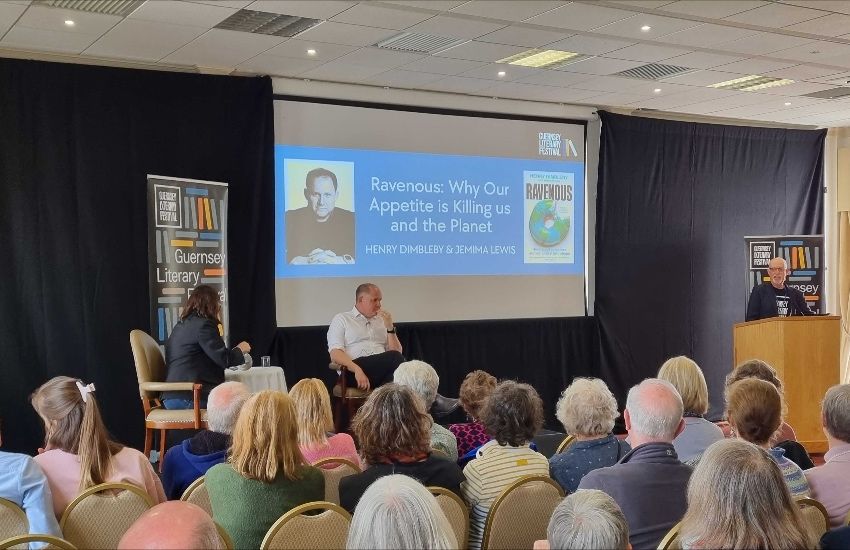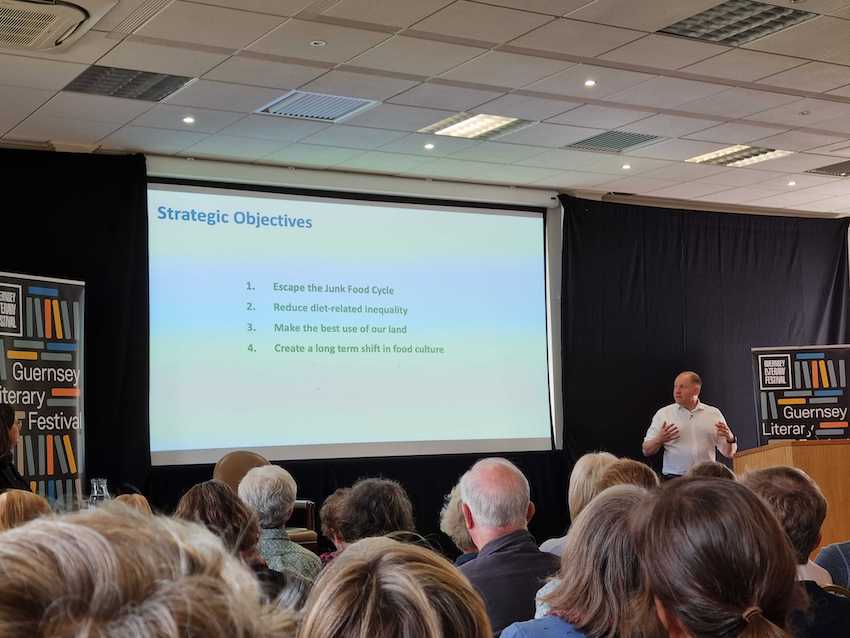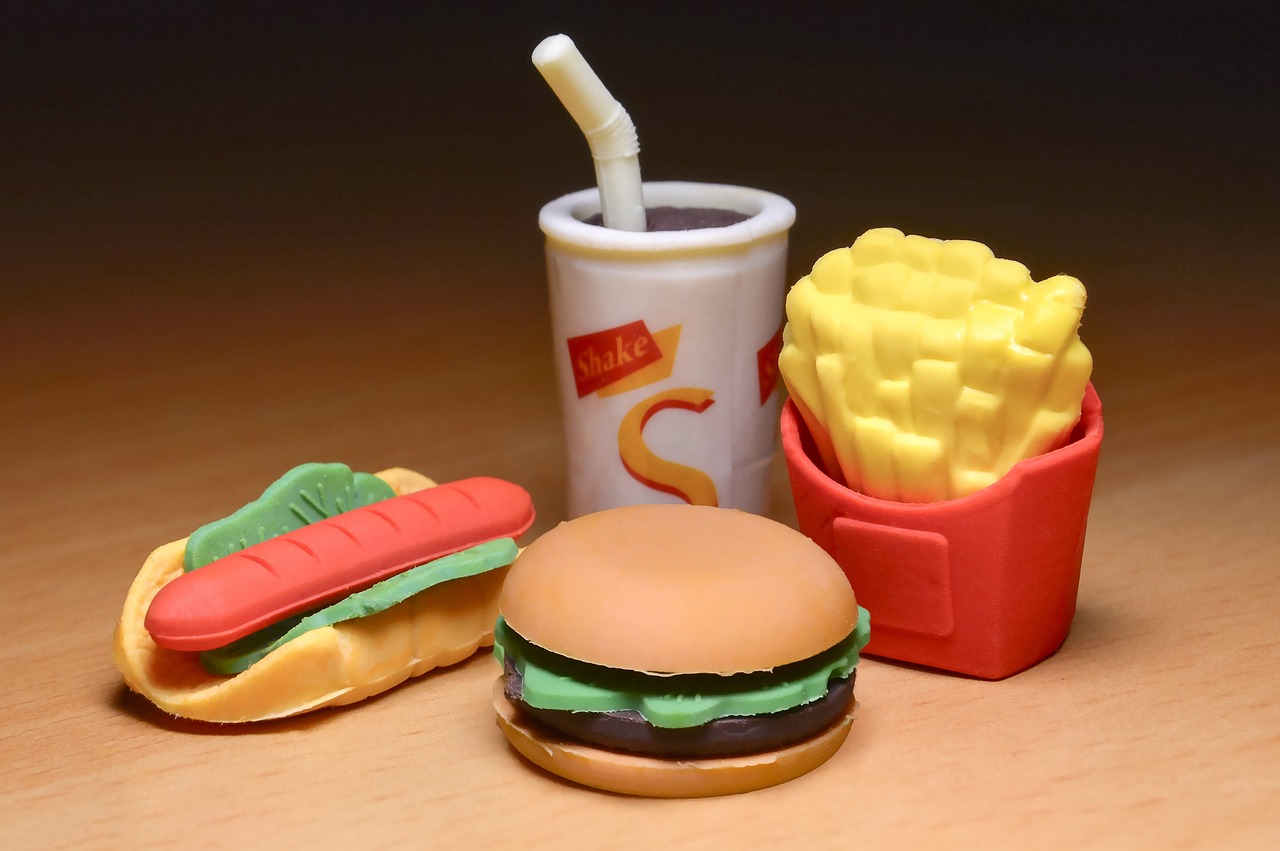


Without a reduction in junk food and meat there will be disastrous consequences to the environment, people’s health, and the economy, according to the man who penned the UK’s National Food Strategy
Henry Dimbleby, who is also a co-founder of the restaurant chain Leon, was speaking at the Guernsey Literary Festival yesterday. He was flanked by his wife, Jemima Lewis, who together wrote and edited the new book ‘Ravenous: How to get ourselves and our planet into shape’.
He argued that diet is proving to be a disaster for both the NHS and economic growth, with more people becoming sick and out-of-work than ever before. This trend is replicated across all western countries, he added.
But much of those pales to the environmental destruction, at odds with the idea of GDP growth at the centre of the prevailing economic models, which will be difficult to uncouple.
“At the current rate of [nature] decline and growth in GDP, there’s no way we can do it,” Mr Dimbleby said. “Theoretically it’s possible, but we’re a long way off."
Government intervention is required, but individuals can also impart change. As Mr Dimbleby put it, “cogs in the machine can move the machine”, but humanity can’t “just rely on science to eventually” solve the problems.
But government change is slow. Mr Dimbleby quit the UK’s Department for Environment, Food, & Rural Affairs after it failed to adopt, or watered down, his recommendations. That was against a backdrop of serving under five different Secretaries of State, frantic no-deal Brexit planning, a pandemic, a war, and four different Prime Ministers in a few years. “Never in that scenario are you going to get anything done."

Pictured: Mr Dimbleby laid out four objectives from his report and book.
The aim of his food strategy was to explain a complex system – agri-food and health – to alter the common understanding of it, and then recommend policies to shift that system: “What was going wrong, and how do we fix it”, Mr Dimbleby said.
It painted a story of “miracle and disaster”, detailing how the fears of rapid population growth from the late 1940s sparked attempts to rapidly ramp up agricultural productivity through selective breeding of crops and the development of synthetic additives to boost yields.
This ‘Green Revolution’ helped to stave off predicted famine and war, the possibility of which appeared frequently in newspaper articles in the late 40s based on Malthusian’s theory of societal collapse.
The miracle is clear today, with twice as much food, grown on a smaller area of land, for billions more people than in 1945. Mr Dimbleby labelled it as one of humanity’s greatest achievements. But now “food completely dominates our environment” since yield was prioritised above all else for decades.

Pictured: The UK has one of highest rates of obesity in Europe, and consumes a high amount of junk food.
That has led to an environmental, health and economic disaster, he argues.
All livestock, for example, now weighs twice as much as humans with wild animals, dominant 10,000 years ago, also being dwarfed. Livestock also requires most of the arable land in Britain for pasture and feed.
“The real issue with too much meat is the amount of land used”, Mr Dimbleby said, arguing that veganism is not required but reduced consumption of meat is to take pressure off the land. He estimates around 30% more fruit and vegetables need to be eaten, with a 25% reduction in meat and junk food, to improve environmental and health outcomes.
Assuming a 2.5 degree rise in average global temperatures in the coming decades, wheat yields are predicted to increase in the northern hemisphere. But in the warmer southern hemisphere, a near total collapse in production is expected triggering bread riots, mass environmental migration, and war.
The certainty of high-yielding crops has also created a junk food cycle – a negative feedback loop. Those cheap staples are made into processed foods with a “crack-like” balance of sugar, salt, fat, and carbohydrates which makes them irresistible to our appetites. The popularity of such products encourages companies to focus on their production for profit.
This is clear since the total sales of confectionary in Britain outstrips sales of fresh fruits and vegetables by around £1.7bn per year.
Fascinating @GuernseyLitFest event with @HenryDimbleby and @gemimsy on Ravenous, their book about understanding the food system and the leverage points to change it to benefit people’s & planetary health. Great to see so much interest in a topic close to @healthimprovegg heart. pic.twitter.com/cTaaIOCgNM
— Dr Simon Sebire (@Simon_Sebire) May 10, 2023
Part of the health solution, he said, is getting hospitals and schools on board to “do the right thing”. Further restrictions on junk food advertising – particularly online – and limiting supermarkets’ ability to display high fat, salt, and sugar foods, and “BOGOFs” should also be considered.
There is also space for lab-grown meat, but the cost is currently prohibitively expensive. However, it will become the “responsible” option for nations which import most of their meat.
Guernsey should also focus on branding itself as a “nutritious and carbon neutral” island going forward. This is since places like the Channel Islands and the UK are “never going to win selling commodities” in the global marketplace. “You can be the cheapest, or you can be differentiated”, he added.
Only 4% of food is locally produced
Comments
Comments on this story express the views of the commentator only, not Bailiwick Publishing. We are unable to guarantee the accuracy of any of those comments.